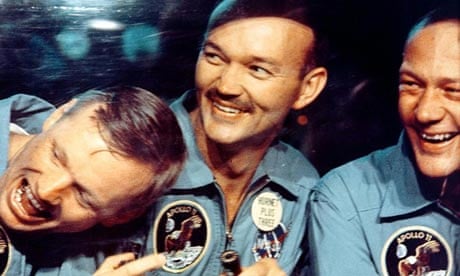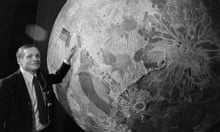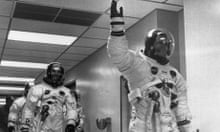It was a moment that still defines what many have come to call the American century. Amid all the turmoil and horror of that most bloody 100-year stretch, the sight of the first human being to walk on the moon, transmitted on television screens all over the world, was a sublime vision, the power of which was not marred by the blurry images that brought it back to a breathlessly awaiting Earth.
This was the moment that Neil Armstrong stepped on to the lunar surface on 20 July 1969, and said the immortal words: "That's one small step for man, one giant leap for mankind." The fact Armstrong seemed to fluff his lines, omitting the vital, modest "a" before "man", did not matter a jot. Humanity had finally broken the bonds of earth and put one of the species on another planet.
The rhetoric was universal, but it was really a wholeheartedly American triumph. The flag planted on the moon was an American flag.
The man doing the walking was born in the small town of Wapakoneta, Ohio: about as all-American as you can get. He was also fulfilling the dreams of that other icon of muscular American patriotism, President John F Kennedy, who had urged his nation in 1961 to go forwards to reach for the moon – and put one over the Soviets at the same time. Kennedy had died back in 1963, laid low by an assassin's bullet in another one of those moments that all Americans remember.
Indeed, in many ways Armstrong's triumph was a much-needed feelgood counterpoint to the horrors of the Kennedy killing. The event, coming as it did at the end of the turbulent 1960s, functioned as a brief national antidote to the whole decade. This was a tumultuous period that had seen Kennedy slain, the civil rights movement triumph and then despair over the killing of Martin Luther King and the spreading blaze of race riots. The 1960s saw vast and unsettling social change, the beginnings of white flight and urban decline and the upheaval and national trauma of Vietnam.
But for that single moment staring heavenwards – as the world focused on the sheer derring-do and genius of American ingenuity – none of that really seemed to matter. America was a country that in eight short years had lived up to the command of its slain hero president and put a man on the moon. Staring up in the night sky at that silvery circle above would never be the same for anyone again.
The whole world watched. Armstrong's step was witnessed by a global audience on television or radio that some estimate at a staggering 600 million people – the largest ever for a single event and an amazing one-fifth of the world's population at the time.
The landing sent a message that America could compete in and win the cold war. The nation had been startled and terrified by the Russian success in putting the first satellite, Sputnik, into space. Suddenly, there was a fear that America might never catch up. But, in eight short years, the Apollo programme dragged the country ahead.
Just as ordinary people had been scared witless by the thought of a beeping Russian probe overhead, so they now celebrated the triumph of the moon landing. Families huddled around their television sets in awe together. Those without the then expensive devices booked into motel rooms so they could watch too. It was a popular rumour at the time that some people even peered up at the moon through telescopes hoping to catch a glimpse of the American citizens they now knew were walking around up there. For Armstrong himself, the moment was a mixed blessing. He passed into the history books and he was assured of global fame. But he was also a quiet person. After he returned home he was given a parade in New York and embarked on a 22-nation world tour. But within a few years he had accepted an academic job at a university in the Ohio city of Cincinnati. He even bought a farm and started to grow corn and raise cattle. He did not give many interviews and rarely talked of his experiences. Asked once what it had meant to him, he replied that it had made him feel "very, very small".
But then the moment itself was not about Armstrong. It was about his nation. The achievement was not stepping off that ladder and kicking up the dust on the moon. It was about the thousands of engineers who had worked so hard to get him there. It was about the public money poured into the sheer effort by a government determined to explore beyond the bounds of earth, now that every corner of the globe was known. It was about celebrating the wealthiest and most powerful nation the world has ever seen and the nature of its crowning achievement: not the conquest of another people, but the act of putting one of its own on another world. If ever America deserved to feel proud – and the world instinctively felt proud of America – it was then. Of course, the moment is now seen within an historic context.
After that great triumph, the following decades saw American cities decline and, in some cases such as Detroit, they were hollowed out into post-industrial wastelands. American manufacturing fled overseas as ruthless corporations sought lower wage costs. The cold war was won, but it seemed an odd sort of triumph. Before a peace dividend could be declared and built upon, the so-called war on terror began, and the invasion of Iraq and its chaotic aftermath, followed by the financial crisis shocked the country to its core.
The Apollo programme itself had ended. When Armstrong landed on the moon, no one could have known that the last man to walk on the moon – fellow astronaut Eugene Cernan – would follow him just three years later in 1972. No one has been back since. At the time it had seemed the beginning of a remarkable new journey. But it was not.
Rather, it was the summit of a nation's achievement. It was a peak of progress. Now the next person to land on the moon is almost certain to be Chinese. Armstrong's amazing step did not, in the end, lead America anywhere.






Comments (…)
Sign in or create your Guardian account to join the discussion